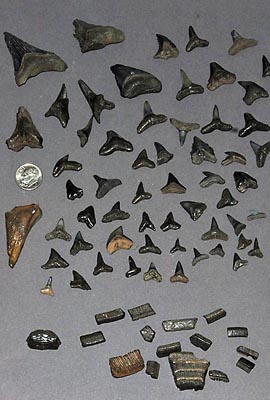Fossil Hunting
Fossil hunting in Florida is another past time that several of our chapter members enjoy doing. Anyone lucky enough to find a Shark tooth or Ray teeth in Florida are free to keep them, as collecting them is open to everyone. Anyone collecting other types of fossils is required to obtain a Fossil Hunting Permit from the University of Florida. Make sure to read through the requirements as they require you to send in information on specimens you collect.
Peace River near Wauchula, FL.
Be sure to check out some of the Fossils the chapter found in past hunts. Many have been identified, with some to the species level. Assignments by the University of Florida.
Hunting Areas
Beaches and major waterways open for public activities are usually are open for fossil hunting, but most locations within State Parks are off limits and those on Private Property will require permission from the owner. Make sure to check with State Park officials to determine if Fossil Hunting is allowed as those with access to Gulf or Atlantic beaches may permit iton the beach only. Check with Fossil Hunting Clubs local to the area your thinking of going to as they may provide you with specific site information.While finding a shark tooth on a beach is possible all over, Venice beach Fl. is by far the best one to head to if you can.
The chapter has been to Rucks Pit for fossil clams, and the Peace River as it has many road crossings where the river runs shallow during Florida's Dry season.
Safety Concerns
Rivers, Streams and Lakes require additions attention. Many have water stained dark brown due to tannins released by decaying plant matter. This hinders the hunting ability somewhat, but most of all waters like this will hide several dangerous reptile species that reside in Florida's. The American Alligator and Water Moccasin are found across the entire State and precautions are necessary. Better safe than Sorry.NEVER ENTER WATERS WHERE ALLIGATORS ARE VISIBLE IN THE AREA.
It is just too dangerous.
Eastern Diamondback Rattlesnakes, Pigmy Rattlesnakes, Coral Snakes and Copperheads are also found in Florida. The Chapter recommends learning as much as possible about each of the reptiles mentioned above before heading out on a Fossil Hunting trip.
Keep your eyes on the surrounding area when accessing and leaving a hunting site as most often they will be near the shoreline or on the land nearby. If one is spotted, keep a safe distance from them.

American Alligator, FL.
Tips
1. Check with local officials, and follow all rules and regulations.2. Wear old sneakers or water shoes with closed toes to protect your feet.
3. Do not dig into the river or stream banks.
4. If you dig a deep hole in an area others will be using for other activities, please fill it back in before leaving. It's hazardous to suddenly step into a hole while walking.
5. Use the proper equipment. A Shovel, floating screen, gloves and a long thin metal rod to probe the sand for gravel are pretty much a must.
6. Fossils will be found in greater quantities where you feel gravel as you press the metal probe into the sand.
7. Take only as many you need as this resource is not replenished.

Shark and Ray teeth.

2.5 inch Horse Tooth.
